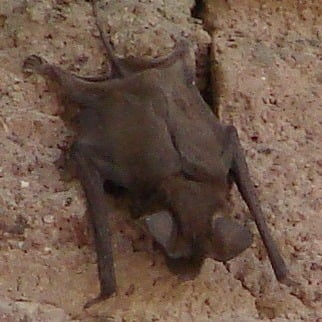Park rangers warn about interacting with wildlife;
Woman bit by rabid bat
DEATH VALLEY, Calif. – Park rangers are reminding the public not to touch, handle, or feed wildlife. Two recent incidents Death Valley National Park show the risks to human and wildlife from these interactions: a woman was bitten by a bat with rabies and a coyote was struck by a car.
Bat with rabies
On April 28, a bat was seen behaving strangely. It was sitting on top of a garbage can outside the Stovepipe Wells general store. A concession employee moved the bat away from the public space. The bat bit her through her nitrile gloves. National Park Service employees collected the bat, and California Department of Public Health tested it for rabies. On May 2, the woman was informed that the bat did have rabies. She is being treated for rabies exposure.
Anyone who may have had contact with this bat should contact Inyo County Health Department at 760-873-7868 for medical guidance.
Rabies is usually fatal, unless treated before symptoms begin. Humans can get rabies through contact with an infected animal’s saliva, such as a bite or scratch. Any mammal can carry rabies. People should be especially concerned when an animal is behaving aggressively or does not show a normal fear of humans.
Bats are an important part of the ecosystem. At least nine species of insect-eating bats live in Death Valley National Park. Typically, less than 1% of bats have rabies. Bats—and all other native wildlife—are protected within the park.
Coyote struck by vehicle
A week earlier a coyote was struck by a vehicle on CA-190 near the intersection with Badwater Road. The coyote limped away, and it is not known if it survived. Some coyotes in the park have learned to associate vehicles with people feeding them, which is illegal in the national park. Habituated coyotes have learned that they can stop traffic by walking in front of moving vehicles.
How to stay safe around wildlife
- Never approach, touch, feed, or pick up a wild animal. Please enjoy wildlife from a safe distance.
- If you see sick, dead, or erratic behaving wildlife in the park, notify a park employee.
- Consult with your doctor in the event you have contacted an animal thought to be rabid.
- In areas where pets are allowed, make sure that pets are always vaccinated and kept on a leash.
- Stay out of mine openings and other places bats are likely to roost
Death Valley National Park is the homeland of the Timbisha Shoshone and preserves natural resources, cultural resources, exceptional wilderness, scenery, and learning experiences within the nation’s largest conserved desert landscape and some of the most extreme climate and topographic conditions on the planet. Learn more at www.nps.gov/deva.



















Nitrile gloves?
Duh.